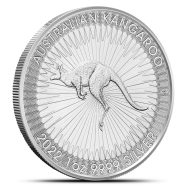

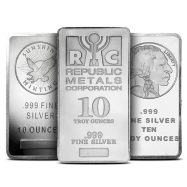
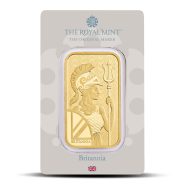

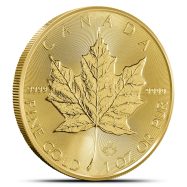
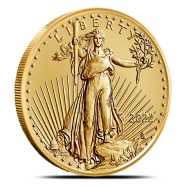
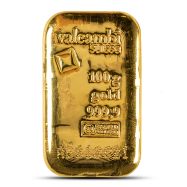
Have you decided to buy bullion but haven’t quite worked out the details of exactly what you want and where (or how) to buy it? With a plethora of bullion products available from thousands of different sellers, it can be challenging to choose. Here’s a brief guide to help you through the process. We present you with all your options, as well as the pros and cons of each.
 Most people who buy physical bullion, whether in the form of coins or bars in various weights and designs, are interested in owning a tangible, highly liquid commodity that can hedge against inflation. Commodities are different from most other stores of value because they’re intrinsically valuable. A commodity derives its value from its inherent utility, not from a balance sheet or a projection of hypothetical future profits.
Most people who buy physical bullion, whether in the form of coins or bars in various weights and designs, are interested in owning a tangible, highly liquid commodity that can hedge against inflation. Commodities are different from most other stores of value because they’re intrinsically valuable. A commodity derives its value from its inherent utility, not from a balance sheet or a projection of hypothetical future profits.
What sets precious metal bullion apart from other commodities like crude oil or corn is that you can easily store bullion at home.
While you can buy ETFs and stocks connected to precious metals like gold and silver, those investments include the accompanying risks associated with a company’s performance. On the other hand, bullion is a tangible store of value that has long been used as a hedge against currency inflation, rocky financial markets, and economic turmoil. Most investors consider bullion the safest of safe-haven investments, which is why gold and silver have been valued for over 3,000 years.
Bullion most commonly includes the four precious metals most people already know and love – gold, silver, platinum, and palladium – which you can purchase as bars, rounds, and coins. You may find other expensive metals for sale, including osmium, ruthenium, rhodium, and iridium. You may find other industrial metals for sale, including copper and nickel. However, here in the U.S., only four elements are widely recognized as “precious metals.” Additionally, only gold, silver, platinum, and palladium bullion are legally allowed investments within a self-directed IRA.
Bars and rounds are the simplest, most affordable types of bullion. Any refiner can produce them and make them in various sizes. Let’s take a closer look at the pros and cons of each type of bullion.
 Gold is the prized yellow metal traded and valued by people worldwide for thousands of years. In modern times it’s proven a dependable hedge against inflation, currency debasement, and economic crises, and it’s quite possibly the only globally-recognized store of value.
Gold is the prized yellow metal traded and valued by people worldwide for thousands of years. In modern times it’s proven a dependable hedge against inflation, currency debasement, and economic crises, and it’s quite possibly the only globally-recognized store of value.
Gold is also the most popular precious metal for trading, and if we account for all the gold that’s been mined over time, its market cap is about $11.5 trillion. Gold is a useful metal outside of jewelry and investing and an excellent choice for those looking for a safe haven with less volatility than other metals.
 Silver, which shares a similar history with gold, can also be an effective hedge against inflation and can be bought for a small fraction of the price of gold. Overall, silver is far less popular as an investment and is traded on a much smaller scale. Since silver is significantly more affordable per ounce than gold, platinum, or palladium, silver bullion can require a large space for storage. Though it lags behind gold in the eyes of the public, silver is actually a far more useful metal in the manufacturing and electronic industries. Industrial demand accounts for half of all silver demand. Silver’s value can be influenced by investment demand, industrial demand, supply shortages, and so on. These multiple factors make silver’s price notoriously volatile.
Silver, which shares a similar history with gold, can also be an effective hedge against inflation and can be bought for a small fraction of the price of gold. Overall, silver is far less popular as an investment and is traded on a much smaller scale. Since silver is significantly more affordable per ounce than gold, platinum, or palladium, silver bullion can require a large space for storage. Though it lags behind gold in the eyes of the public, silver is actually a far more useful metal in the manufacturing and electronic industries. Industrial demand accounts for half of all silver demand. Silver’s value can be influenced by investment demand, industrial demand, supply shortages, and so on. These multiple factors make silver’s price notoriously volatile.
 Platinum may look like silver or white gold, but it shouldn’t be confused with either. Platinum is an excellent metal for jewelry since it’s denser, resistant to corrosion, and extremely tough. Platinum jewelry doesn’t require the same level of care as gold and silver.
Platinum may look like silver or white gold, but it shouldn’t be confused with either. Platinum is an excellent metal for jewelry since it’s denser, resistant to corrosion, and extremely tough. Platinum jewelry doesn’t require the same level of care as gold and silver.
In addition, platinum is far rarer than gold. It possesses some unique qualities that make it very useful in manufacturing, particularly in catalytic converters for gas-powered cars and trucks. Platinum is also used in some medical applications because it’s chemically inert in a wide variety of conditions.
Since a large part of platinum’s demand comes from the auto manufacturing industry, keep in mind that platinum’s price will often be tied to the performance of carmakers. Platinum can be an interesting option for bullion investors but may be best for those who already own gold and silver in their portfolio due to the smaller market size and its crucial link to the automotive industry.
Having been discovered just over 200 years ago, palladium is the least well-known of the precious metals, though that hasn’t stopped it from becoming one of the most valuable today. Like platinum, the palladium market is small, so volatility is high. Palladium is also an instrumental metal for manufacturing catalytic converters, electronics, and dental crowns. Palladium has a unique ability, under the right conditions, to absorb tremendous amounts of hydrogen, which may make it a vital element in green energy production.
Though it lacks the same name recognition, palladium, like the other precious metals, is a store of value and hedge against inflation.
Once you’ve decided which metal best fits your investment goals and personal preferences, you’ll have to choose an actual bullion product. Your options include:
Coins, like the 1 oz gold American eagle, are typically the most expensive bullion product per ounce, but the cost comes with a set of benefits only coins can offer. Though bullion coins are also made of precious metals, they have a face value (a nominal value not tied to the worth of its metal content) and can only be produced by official government mints.
Coins are a safe (though more expensive) choice since the government has a strict set of standards for purity and sizes, and they’re easy to buy, sell, and trade. Finally, some coins even have the potential to appreciate in value due to numismatic value. For avid collectors, certain rare coins can fetch an impressive price tag that exceeds the value of the coin’s precious metals (though these collectible or “numismatic” coins trade differently than bullion coins).
Coins are most commonly available in 1 oz weights, though “fractional” weights of 1/10, 1/4, and 1/2 ounce weights aren’t unusual. Coins larger than 1 oz are rare in metals other than silver.
Bars and ingots are among the simplest, most affordable ways to buy bullion. Bars and ingots are easy to store and, of all bullion products, usually sell for the lowest premiums over spot. Both bars and ingots are a great way to invest in physical precious metals to hedge against inflation. Bars commonly come as 1 oz but can be as small as 1 or 5 g and as large as 1,000 oz (68.5 lbs).
“Rounds” is an industry term that means “coin-like objects produced by non-government mints.” They provide some of the same benefits as bars and ingots, with the only real difference being the shape. As the name suggests, rounds are round in shape and look very similar to coins. Rounds usually come in a smaller range of sizes than bars (often between 1/10 oz – 1 oz), but they serve the same fundamental purpose as a hedge against inflation and a bet on precious metals alone. One popular choice for buying is the 1 oz SilverTowne Buffalo round.
Rounds may be sold in bulk by weight. Other specialty mints produce elegantly-designed rounds that are really collectible works of art (if in doubt, look at the price!).
The first step to buying bullion is deciding what you want to get out of your purchase. If your top priority is to hedge against inflation and economic uncertainty, gold bars and rounds might be best for you.
For individuals looking to hedge against inflation and invest indirectly in certain industries, silver, platinum, and palladium bars and rounds are a great choice.
Coins are usually the bullion of choice for coin collectors and speculators on numismatics or those who seek a more conservative option that will always retain some value.
Thanks to the internet, you have a vast selection of options on where you can purchase bullion. Of course, there are brick and mortar bullion dealers, coin and pawnshops, and coin shows for those who prefer to buy in person. And, let’s not forget about buying directly from mints, which is always a solid choice for some high-quality bullion (however, many sources, including the U.S. Mint, only sell to authorized dealers).
Nevertheless, buying from a reputable online bullion dealer, like BullionMax, is the best choice for most people because it gives you convenient, 24/7 access to the largest selection of affordable bullion.
When buying bullion, some essential things to keep in mind are:
If you’re buying bullion online, make sure to take a look at the fees associated with shipping and that you’re buying from a reputable dealer who will take care to package your bullion properly. Some companies, like BullionMax, offer free shipping on orders over $199.
_1000.jpeg) It’s imperative you have a secure place to store your bullion before you purchase it. While you can store small amounts of bullion in a home safe, a precious metals depository or safety deposit box at a bank are generally the preferred options for bullion storage.
It’s imperative you have a secure place to store your bullion before you purchase it. While you can store small amounts of bullion in a home safe, a precious metals depository or safety deposit box at a bank are generally the preferred options for bullion storage.
Your home insurance should cover bullion losses, but the limits are low and inadequate for many. The best option for bullion insurance is to keep your bullion with a precious metals depository that carries insurance to cover the full value of your bullion in the event of a loss.
If you’re buying bullion for your IRA, the IRS prohibits you from storing the bullion at home. IRS Section 408(m)(3) requires a custodian or non-bank trustee to take possession of the IRA bullion, so be sure to avoid home storage IRAs accordingly.
Some other factors to consider when buying bullion include the availability, price, quality, weight, and mintage of the bullion you’re interested in. Take a look at spot prices and see what the markup is on the product you’re considering. Be sure to check for a certificate of authenticity or assay card so you know where your bullion was minted. Since bullion products can vary drastically, you’ll also want to verify the purity and weight of the metal.